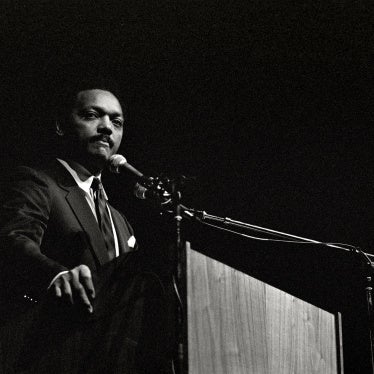Armored vehicles patrolling the streets. Police in camouflage, pointing assault rifles at peaceful protesters. The unnecessarily militarized response to the protests in Ferguson, Mo., was a low point in police-community relations in the United States, as well as a shameful example of disproportionate police actions undermining freedom of speech and assembly.
President Obama noted as much, stating in regard to the protests that the "constitutional rights to speak freely, to assemble, and to report in the press must be vigilantly safeguarded, especially in moments like these. There's no excuse for excessive force by police or any action that denies people the right to protest peacefully."
Last week, the White House took a first step toward preventing another Ferguson-like response when a working group established by executive order in January issued recommendations to limit the transfer of federal military-style weaponry to state and local governments.
The law enforcement overreaction in Ferguson was, of course, not just due to the availability of military-style equipment to local police. As Human Rights Watch documented, law enforcement failed to establish reasonable rules regarding the protests — and when they did, they failed to communicate the rules clearly or give protesters a fair chance to comply.
Yet the easy availability of military-style equipment played a role in the overreaction. Law enforcement's use of armored vehicles and assault weaponry clearly intimidated protesters, as we documented in a letter to Missouri Gov. Jay Nixon (D) last September.
Last week's working group report incorporates a number of recommendations that Human Rights Watch made to it, and should help to reduce the likelihood of similar intimidation in the future.
First, the working group developed a list of equipment that will no longer be transferred to local law enforcement agencies. These include items like tracked armored vehicles, grenades and camouflaged uniforms.
Human Rights Watch recommended to the working group that the United States prohibit local law enforcement from deploying military equipment received from the federal government to deter peaceful assembly and free expression. The working group specifically addressed this concern by citing policies of the University of Texas System Police, which explicitly prohibit the use of armored-style vehicles in response to "exercises of the First Amendment right to free speech." More broadly, the working group also recommended that any law enforcement agencies that acquire federal equipment adopt policies and protocols consistent with the U.S. Constitution, with specific protocols addressing the First Amendment.
The working group also recommended that law enforcement agencies collect and make available data on the use of military-style equipment for "significant incidents," including any "demonstrations or public exercise of First Amendment rights," also in line with our recommendations. For these significant incidents, law enforcement agencies will have to collect and retain information on the equipment involved, the personnel who used it, civilians involved in the incident, and the result of controlled equipment use, including arrests or use of excessive force.
In our recommendations to the working group, we also called for the prohibition of transfers of military equipment to local law enforcement agencies implicated in human rights violations. The working group took a half-step here: Instead of an outright prohibition on transfers, law enforcement agencies applying for military equipment would have to report whether they have been found in violation of federal civil rights law within the previous three years. That information would be used as one of the criteria for the federal government to consider when deciding whether to transfer equipment. The working group also proposed sanctions for violations related to the use of transferred military-style equipment, including a minimum 60-day suspension from receiving transfers and a referral to the Justice Department for any alleged violations of law.
The rights to peaceful assembly and free expression are protected under both the U.S. Constitution and the International Covenant on Civil and Political Rights, which the U.S. ratified in 1992. The covenant not only applies to the federal government, but also to state and local governments. Law enforcement personnel are obligated to protect and uphold those fundamental rights.
Last week's recommendations are a small but important step in upholding these rights. They highlight that in times of strife and unrest, it should not be about police versus the community. Instead, it should be about the police understanding that they are part of the community. An excessive police reaction to protests harms both. Getting some military equipment out of the hands of local police, and controlling the rest, may help to prevent those self-inflicted wounds in the future.








